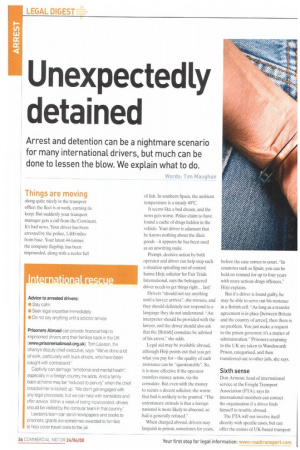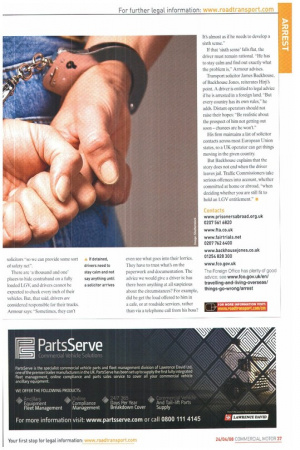Unexpectedly detained
Page 36

Page 37

If you've noticed an error in this article please click here to report it so we can fix it.
Arrest and detention can be a nightmare scenario for many international drivers, but much can be done to lessen the blow. We explain what to do.
Words: Tim Maughan
Things are moving
along quite nicely in the transport office; the fleet is at work, earning its keep. But suddenly your transport manager gets a call from the Continent. It's bad news. Your driver has been arrested by the police, 1,400 miles from base. Your latest 44-tonner. the company flagship, has been impounded, along with a reefer full of fish. In southern Spain, the ambient temperature is a steady 40('C.
It seems like a bad dream, and the news gets worse. Police claim to have found a cache of drugs hidden in the vehicle. Your driver is adamant that he knows nothing about the illicit goods it appears he has been used as an unwitting mule.
Prompt, decisive action by both operator and driver can help stop such a situation spiralling out of control. Saima Hui, solicitor for Fair Trials International, says the beleaguered driver needs to get things right... fast!
Drivers -should not say anything until a lawyer arrives-, she stresses, and they should definitely not respond to a language they do not understand. -An interpreter should be provided with the lawyer, and the driver should also ask that the (British] consulate be advised of his arrest," she adds.
Legal aid may be available abroad, although Hirji points out that you get what you pay for the quality of such assistance can be "questionable". So. it is more effective if the operator transfers money across, via the consulate. But even with the money to secure a decent solicitor, she warns that bail is unlikely lobe granted. "The unfortunate attitude is that a foreign national is more likely to abscond, so bail is generally refused."
When charged abroad, drivers may languish in prison, sometimes for years, before the case comes to court. "In countries such as Spain, you can be held on remand for up to four years with more serious drugs offences," Hirji explains.
But if a driver is found guilty, he may be able to serve out his sentence in a British cell. "As long as a transfer agreement is in place [between Britain and the country of arrest], then there is no problem. You just make a request to the prison governor; it's a matter of administration." Prisoners returning to the UK are taken to Wandsworth Prison, categorised, and then transferred out to other jails, she says.
Sixth sense Don Armour, head of international service at the Freight Transport Association (VIA), says its international members can contact the organisation if a driver finds himself in trouble abroad.
The FTA will not involve itself directly with specific cases, but can offer the names of UK-based transport solicitors -so we can provide some sort of safety net".
There are 'a thousand and one' places to hide contraband on a fully loaded LGV, and drivers cannot be expected to check every inch of their vehicles. But, that said, drivers are considered responsible for their trucks. Armour says: -Sometimes, they can't even see what goes into their lorries. They have to trust what's on the paperwork and documentation. The advice we would give a driver is: has there been anything at all suspicious about the circumstances? For example, did he get the load offered to him in a cafe, or at roadside services, rather than via a telephone call from his boss? It's almost as if he needs to develop a sixth sense."
If that 'sixth sense' falls flat, the driver must remain rational. "He has to stay calm and find out exactly what the problem is," Armour advises.
Transport solicitor James Backhouse, of Backhouse Jones, reiterates Hirji's point. A driver is entitled to legal advice if he is arrested in a foreign land. "But every country has its own rules," he adds. Distant operators should not raise their hopes: "Be realistic about the prospect of him not getting out soon — chances are he won't."
His firm maintains a list of solicitor contacts across most European Union states, so a UK operator can get things moving in the given country.
But Backhouse explains that the story does not end when the driver leaves jail. Traffic Commissioners take serious offences into account, whether committed at home or abroad, "when deciding whether you are still fit to hold an LGV entitlement..;
Cdnfartc www.prisonersabroad.org.uk 0207 561 6820 www.fta.co.uk www.fairtrials.net 0207 762 6400 www.backhousejones.co.uk 01254 828 300 www.fco.gov.uk The Foreign Office has plenty of good advice; see www.fco.gov.uk/en/ travelling-and-living-overseas/ things-go-wrong/arrest












































































































































































